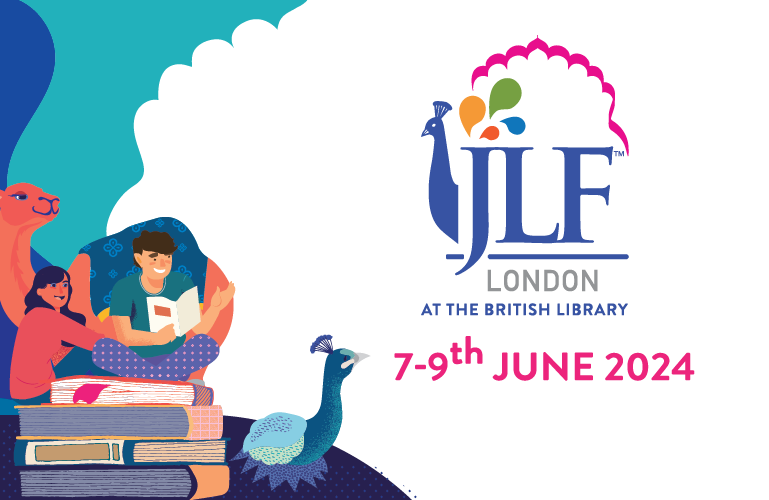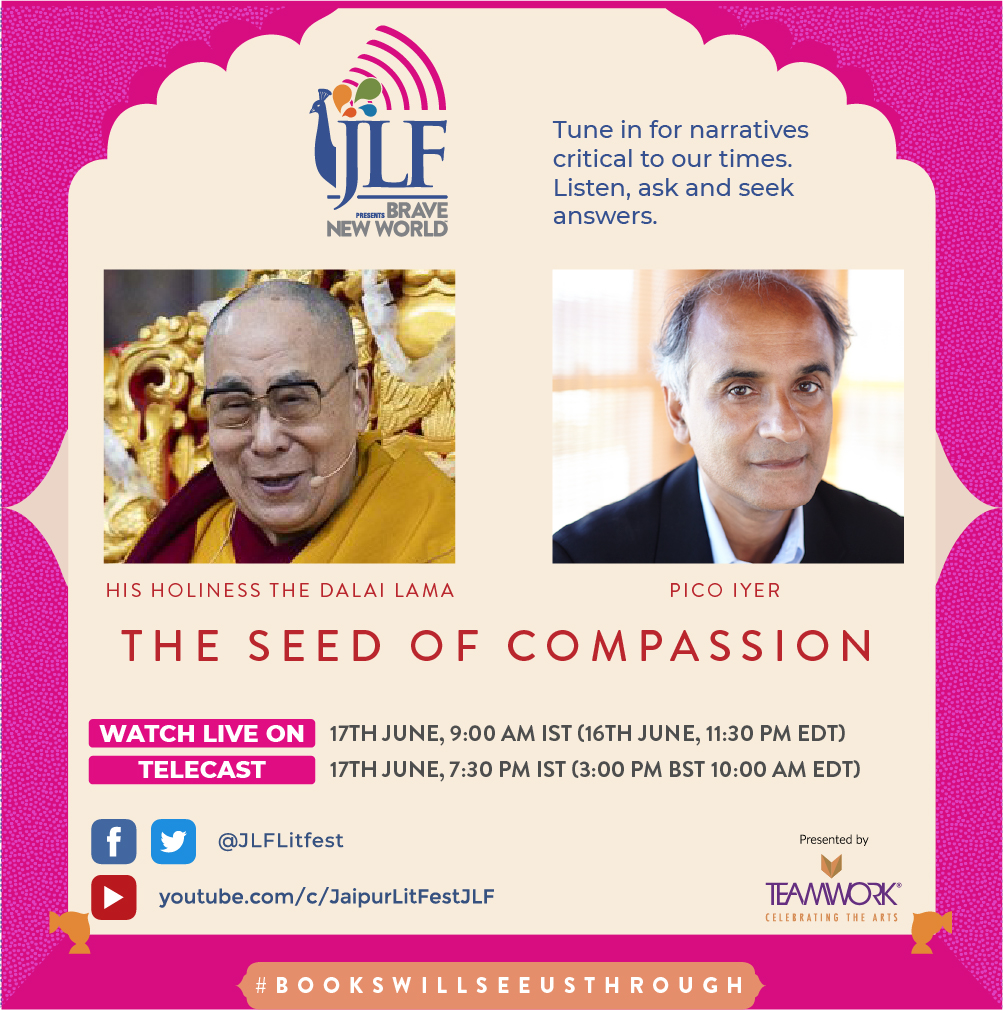


The Seed of Compassion
On a Wednesday morning, I tuned in to #JLFLitFest’s Brave New World to listen to the most beloved stateless man in the world. The Dalai Lama charmed every viewer as he normally does, breaking into chortles of laughter followed by profundities which surprised and stirred me for their common sense and elegance.
I realised through the course of the talk that he would have meditated for four hours as part of his daily routine before he sat for the interview, when most of us were getting into bed after bingeing on television shows or rolling out of bed, clutching caffeine. I feverishly made notes of all he said and decided that this blog should not be adulterated with my words, just his. So here is a collection of the best of what I heard that day.
The four commitments of the Dalai Lama
“I am one of the 7 billion human beings. We are social animals and our basic nature is compassion. Without touching religion, just through research, I try to promote warm-heartedness. We are one world.”
“I am committed to religious harmony. Conflicts and killing in the name of religion is unthinkable. All religion teaches us loving kindness, forgiveness, tolerance. India is an example that religious harmony is possible.”
“My third commitment is to Tibetans. They trust me. I have a moral responsibility. I have retired from politics and am just a Buddhist monk. We now practise democracy in our community here. In the future too, the Dalai Lama will have no political responsibility. And yes, Tibet is called the Roof of the World. Several major rivers originate in Tibet. So taking care of the ecology of Tibet is very important. Snowfall has become less with every decade. Even in Dharamshala – when I came in 1960, that winter there was a lot of snow. Since then it’s reduced every year. Global warming is a very serious matter. I often express that we have to preserve the ecology in Tibet.”
“My fourth commitment is to revive ancient Indian knowledge in modern India.The education system today should introduce ancient Indian knowledge about the inner world which is secular. Ahimsa (non-violence) and Karuna (compassion) should be introduced in our education. It’s not too late.”
Dalai Lama on Education
“In the 8th century, the Tibetan king invited the great philosopher from Nalanda to Tibet. He introduced the Nalanda tradition of Buddhism in Tibet, which we have followed for a thousand years till today. It’s a very sophisticated, logical philosophy. That gives us Tibetans very sharp minds! Very good!”
“When I was 6-7 years old, I started memorising the root texts of scriptures. We studied the texts and the commentaries on these by various scholars.”
“Buddha himself advised, ‘all my followers should not accept my teachings out of faith but rather, after thorough investigation.’ Raise questions, investigate, and use human intelligence before you accept. “
“I jokingly say that in ancient times Indians were guru and we were chela. In modern times it’s the opposite. The Tibetans are now guru.
“India should revive traditional, secular education to train the mind – ancient Indian knowledge of the inner world along with modern education – India can help humanity which has only material development.”
“If I gather with top scholars, my knowledge is quite limited. But amongst ignorant people, my knowledge is quite good. Hahaha!”
“I enjoy India’s freedom. It’s unfortunate that we are refugees. But there is much better opportunity here to utilise my limited knowledge.”
Dalai Lama on world politics and peace
“We really need the sense of oneness of all 7 billion people. The time of ‘my nation’ is gone. We need to think of us as ‘we’, human beings on this planet.”
“War is a feudal idea. Kings, queens, religious leaders had a strong concept of ‘we’ and ‘they’ which led to conflict. Now we are in a democratic world. If you ask each soldier, if he wants to sacrifice his life for his nation, I think he will say he wants peace. Through education we can develop a peaceful world.”
“Think humanity, no national boundaries. Then each community gets maximum benefit.”
“The European Union after the two World Wars is wonderful. There have been no wars, since then among the member nations. I think Russia should become a part of the Union too. And the African nations and Latin American countries should have such unions. And all nations should have equal representation. The power of veto is undemocratic.”
“There is a huge gap between the rich and poor. It’s unthinkable. The sense of oneness of human beings will reduce this gap.”
“My nation, my religion – is a source of many problems. Shia-Sunni are killing each other in different countries. I have never heard such a problem in India because of its religious harmony.”
“India can make a great contribution by increasing its concept of Ahimsa in the world and eventually demilitarising the world.”
The Dalai Lama’s way of living
“I wake up at 3.30 am. Today at 3 am, I had a short dream - of some deities blessing me. It gives a lot of strength.”
“These days they ask me not to meet people except on television. So I’m on holiday.”
“I sleep for nine hours. Then I meditate for four hours. This makes my mind very sharp.”
“You can check my face. And voice - quite healthy. The Panchen Lama lived up to the age of 108. People say I should also live that long.”
“In Buddhism we have the concept of Shunyata – that is no independent self. Anger etc. come from a strong sense of ‘I’. All destructive emotions come from that.”
“We have to reduce the sense of ‘I’, follow the Buddhist philosophy of Anatman – selflessness. When I meditate and look within myself – my body is of Dalai Lama, but inside – nothing. There is no ‘I’.”
“Karuna (compassion) and Ahimsa (non-violence) give me strength. And self-confidence. I meditate on Karuna as soon as I wake up.”
“I really enjoy being a refugee in India. Tibetan Buddhists feel that once in a lifetime they should make a pilgrimage to Bodh Gaya. As a refugee, I can go there every year. Hahaha!”
“On one hand I am a refugee, stateless. On the other hand I belong to humanity.”
After watching the interview, I looked up documentaries on His Holiness that abound on YouTube. I found an unruffled, smiling 23-year- old version of him stepping onto Indian soil, in March, 1959, after a harrowing escape from Lhasa. He looked cool as a cucumber. His mother and sister looked as peaceful, as though they were returning from a pleasant walk. Where did this calm spring from? I rummaged around and found this,
“When we’re born, our mothers show us compassion. This is a natural response that has nothing to do with spiritual practice. Without that kindness we wouldn’t survive. So, our lives start with an experience of kindness and compassion. When we’re dying, being surrounded by gold and jewellery is of no solace at all, but having caring family and friends around us puts us at ease. This is how important compassion can be.”
The seed of compassion was sowed at his birth and was fed with kindness and knowledge. He assures that each of us could find a bit of that calm if we allow ourselves to be led into those same pastures of Karuna. And yes, nine hours of sleep!

Leave a comment